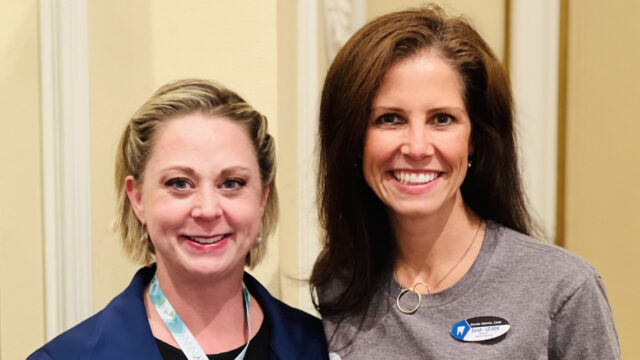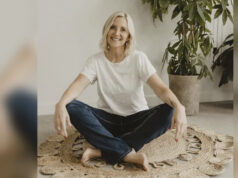Welcome back, everyone, to Answers for Elders Radio Network, and I am here with Sarah Luetke, who is the founder and CEO of Sound Dental Care. And Sarah, I’m so glad we’ve been talking about seniors and dental health, all different types of situations where um, we may be neglecting ourselves and and certainly being in a situation where we’re concerned about a loved one. You shared with me, Sarah, a story that I would love to have you repeat to start off this first segment about the gentleman that used to be clients of yours and then you treated his wife. Would you kind of reiterate that story to start off the segment with our listeners.
– Yes. I saw a couple – husband and wife’s spouse – for years at the private practice. I was their hygienist at the dental office, and both had excellent teeth, lots of crowns in their mouth. Anytime they needed work done, they financially did it, they could afford it, they believed in it, and they just had beautiful mouths, healthy mouths. And the husband came in one day and I haven’t seen his wife in a few years, and sometimes you just don’t know if it’s appropriate to ask. And so he mentioned her and it brought up the topic, and he said, I haven’t had her in because she now lives in a nursing home, and I’m really worried about her, Sarah.” And he got tears in his eyes and he said, she has 10 to 15 teeth that have broken off to the gum line since you guys saw her last. And her mouth was immaculate when I last saw her. So the dentist came in and we told him this story, and he said, Sarah, you’re starting your your mobile company, why don’t you go to the nursing home and see her? And I said, okay. So I went to the nursing home and saw her, and I took photos and I sent them to my dentist that I was working for, and he said, this patient has Alzheimer’s now, And he said, there is no way I’m extracting all those teeth on her, and you would have a different opinion from a different dentist. Some dentists may extract all of those, but he said, on an Alzheimer’s patient they would need general sedation – and he said, it’s not in her best interest. He said, “why don’t you go do that thing you do?” And that thing the thing I do is silver diamine fluoride and that is a palliative care or an alternative treatment. Silver diamine is an antimicrobial, a prescription topical, and you apply it with a Q-tip, you apply it to a cavity, you can apply it to root tips. I’ve applied it to abscesses where a patient where the medical doctor at a nursing almost say this patient isn’t healthy enough for an extraction, and I said, well, we can’t do nothing. What can we do? And the medical doctor will put the patient on a systemic antibiotic and I will treat it with silver diamine from a clinical point, and together we will try to do everything we can to keep the patient healthy. So this is what I did for my patient, and I continued to care for her for five years. She had quit eating a lot of her favorite foods before the silver treatment. Those teeth did turn black, as it arrested the cavities. If that’s a concern to the patient or the family, you can always have tooth-colored fillings put on top of them. But you don’t have to. Her husband said, no, just leave it. She started eating bacon again. She she lived for five more years, and I cared for her for three months. And the cost, the cost is so much less than doing a filling. And, as a matter of fact, in our practice, we charge no extra for our private pay patients. And if we bill insurance and they don’t pay for it, we write it off because we feel that it is the best thing, better than a cleaning. It’s the best thing we can do for a patient.
– Sure, sure, And you know that’s the thing that a lot of us don’t realize that there are alternatives. And we go to a dentist and we’re fearful of what we’ll find when we get in there. And I know the last time I went to a dentist to get my teeth clean and they took X-rays of my mouth. They told me that it was going to be $3,000 just to get me to ground zero. Well, most of us don’t have $3,000 laying around to do stuff like that. Some don’t have income to even be able to finance something like that. So having alternatives when you’re a senior, and if you’re in a situation where you’re in assisted living, this might be a wonderful opportunity.
– So you work primarily through assisted living, senior living communities, senior centers, or community centers, is that correct?
– Yes, and disability homes, adult family homes.
– Okay, okay, So you could go into an adult family home and do everything, do everyone together. And so I want to talk a little bit about when you talked last time about the lady with dementia. Dementia is a huge issue because you don’t necessarily know if someone’s in their right mind to be able to lay there and be still. How do you handle that?
– Great question. My practice began because my grandfather had a stroke and was in a nursing home. Then my mother-in-law, she has had Alzheimer’s since she was 52 years old. Bless her heart, she’s still alive 21 years Alzheimer’s.
– That is amazing.
– We pray every day that that she gets to go to Heaven soon, because it’s just a very challenging thing. And then I had an uncle, and also my grandmother, and they’ve both passed. They both had Alzheimer’s as well. And what I saw is: all four of my family members had lifetime dental care and had traditional dental care every three to six months and really took care of their mouths. They all went into nursing homes, and all of a sudden, the care just fell off. It is not because the nursing homes are trying to neglect it. It’s that nursing homes have so much on their plate. They are not trained in the mouth. Just like I’m not trained to shower someone.
– I’m part of the American Mobile & Teledentistry Alliance. There’s a lot of independent practitioners like myself, and our goal is that every single nursing home has a dental hygienist in their building at some point. It does not have to be a staff member, but they need to be there. And state auditors are starting to look at this in facilities, and so facilities are loving that our company is willing to come in and see their patients. Our approach is to meet each patient where they are. If they are in their bed. and they can’t get out and it’s a wire lift, and the facility says it’s just not possible. then we see them in be,d and I’ll do everything I can for them. It may not be the same exact cleaning they would get at a dental office, but I’m doing something.
– Absolutely. Alzheimer’s patients, do they allow it?
– I’ve had so many family members and guardians over the years say we’re going to sign them up, but I just don’t think it’s going to be successful. And you see someone in their own home study. You approach them in a way that we make it happen. And we rarely, rarely have a patient we do nothing for.
– And that’s the most important thing. It’s like we all do the best we can with what we’ve got, as we always say. But you know, the idea is obviously is to find ways of you know, comfort. Like we talked about, you used a very important term called palliative care. A lot of people don’t know necessarily what palliative care is, but it is a way to to keep the patient or the individuals as comfortable as possible. And mouth pain can be debilitating and it can can also you know, affect their overall health and you know, certainly having the ability to do that is really important and I’m just so grateful that you’re on and here. So obviously you serve primarily through senior centers and community centers and senior living is your main you know, goal, or nursing homes, If you have a loved one in a nursing home, and how I guess the question is how do you find out if they if they don’t work with you, Can you go to the center and ask them to reach out? Do you reach out to them? How does that happen?
– Great question. So we serve almost 200 nursing facilities throughout the state of Washington at this time, and we started with zero in 2016, so you can see the need out there. And so, family members, if you’re hearing about us on this podcast, you can reach out to us at Sound Dental Care. We – if it’s a facility that we do not serve and we have a provider in that location, we love introductions to the facilities. We reach out all the time to facilities and make calls. They have so many demands on them that oftentimes we don’t hear back or maybe in the future we do have that need. However, we have a family member pull us in.
– We want to make sure that our families out there who have senior loved ones to get the care that they need. And so we’re gonna talk a little bit in our next segment about your vision, your mission, and the future. I also want to talk a little bit about overall tele-dentistry. For those that don’t live in the Puget Sound region, how can they get a similar type of a treatment. Sarah and I will be right back right after this.
















